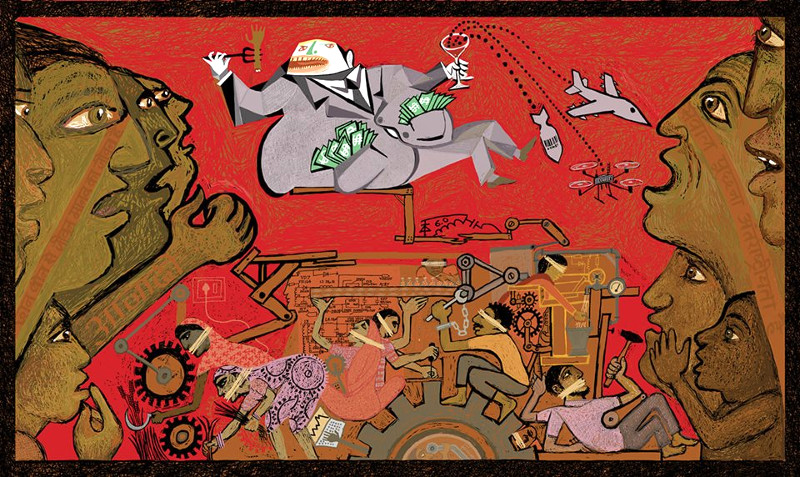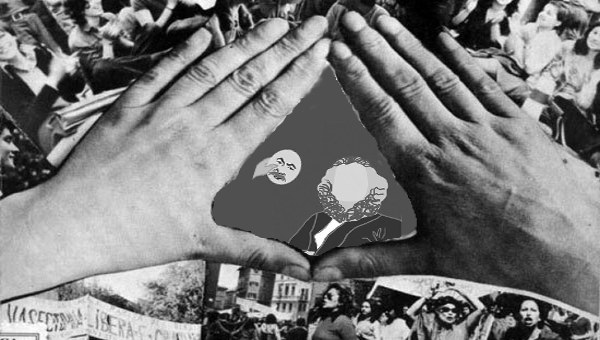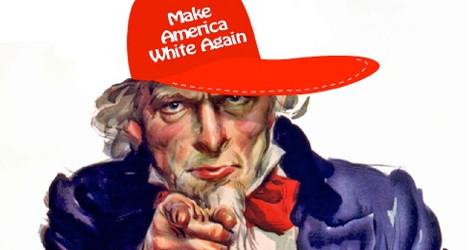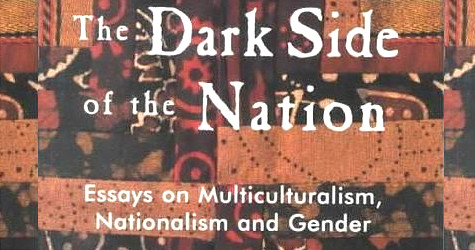— The State and Socialist Strategy 1 —»
Far-Right Identity Politics and the Task for the Left
Identity politics is a key problem of our age, but the problem is typically misunderstood. Usually the left is vilified by the right for encouraging divisive politics rooted in the grievances of different minority groups. These groups are denounced for pursuing selfish agendas that harm the unity of the nation. The right then portrays itself as the guardian of the nations’ unity. In so doing, it identifies its agenda with the universal values and interests of all people.

Those who disagree with the agenda are portrayed as enemies of the people, even in the case that all the opponents added together make up a majority of “the people” in whose interests the right-wing populists claim to speak. Hence, the deepest problem with identity politics is not that people fight against their experiences of oppression on the basis of those aspects of their identity that their oppressors demonize, but that right wing populists falsely identify their particular program with universal values and human interests. Too often, critics on the left who want to defend targeted groups from demonizing rhetoric and oppressive political power make the mistake of rejecting universal human values and interests, rather than the false identification constructed by the right-wing populist movement.
Let us look at how these constructions work in a little more detail. Take the example of the recent Israeli election. In the midst of the campaign, Benjamin Netanyahu openly asserted what had always been true in practice: that although they enjoy formally equal rights, Arab Israelis cannot be true members of Israeli society, because Israel is a Jewish state. Netanyahu was confident that this overtly racist downgrading of Arab-Israeli citizenship would survive the gasps of indignation which always accompany awful truths being spoken in polite liberal company because he has been emboldened by a wave of right-wing populism that operates on the same logic.
Here is How it Works
First, you construct an identity between your party and the nation as a whole. Then, you solidify this logical construction with racial or ethnic cement. Next, you build feelings of power amongst the powerless elements of your supporters by telling them that after years of neglect by “the elite,” their interests are going to be recognized. Finally, you turn these new-found feelings of power amongst the powerless to win office. Once installed, the party continues to serve the political and economic power of the existing ruling class. Both overtly violent and coded, para-violent tactics against opponents supplement parliamentary power.
Understandably, critics focus on the content of the identity (white Americans, Jewish Israelis, and so on) in order to emphasize the racist essence of the right-wing populist wave. There is no doubt that it is racist, but we also have to pay attention to the political logic at work in the building of the movement. Ernesto Laclau’s work on populism is an exception to the tendency to focus only on the content of populist movements and ignore their form. But the form is important, because it reveals the political power of universal appeals. While it is true that there is a hard racist core to contemporary right-wing populist movements, they have won because they appeal beyond the ruling-class interests that they serve to marginalized and dis-empowered elements of the working class. De-coding the “dog-whistle” appeals to racism are important, but so too is understanding the way in which genuinely universal values are perverted in the political identification between the populist movement and the good of the whole nation.
There is a dialectic of inclusion-exclusion at the heart of right-wing identity politics that defines a shared interest against contrived threats posed to the nation by outside and inside forces. The problems with the exclusionary moment are obvious: the outsiders and the “elite” insiders become targets of abuse and physical violence. However, those problems must be condemned while at the same time the political power of the universal appeal is appreciated. The populist movement mobilizes people around positive values as well: self-determination, democratic self-governance, equal respect, and material well-being. The left makes a serious error if it cedes the ground of universal values to the right-wing in favour of a politics of difference that treats universal values as nothing but ideological cover for various forms of domination.
Oppression and Resistance
People will always mobilize around their concrete identities if they are attacked on that basis. If people are attacked for their sexuality, they will have to organize to protect themselves. Members of oppressed racialized communities will have to band together to affirm the value of the differences for which they are threatened. These are natural political responses to the experience of oppression and they will exist as long as oppression exists. Long histories of failure to build effective solidarity increases the suspicion amongst many members of different social movements that the Left cannot be trusted to help secure the satisfaction of their goals. But what I am urging here is deeper than then traditional problem of working class versus identity-based social movements.
Let us look at the cuts announced in the first Ford budget to help us get at the underlying problem. They targeted the environment, healthcare, and education, each of which affects a central concern of human life. Everyone depends upon a life-sustaining natural world. All of us are liable to disease and bodily damage, and the full development of our creative abilities depends upon education. Thus, a healthy environment, public healthcare distributed on the basis of need and not ability to pay, and an adequately funded public education system are all universal life-goods without which we cannot live and live fully. It is true that different groups might experience the cuts in different ways, but what makes the cuts problematic is that they attack the public provision of universal life-goods, damaging people to the extent that they are deprived of the resources and institutions that they require.
What is the rationale behind these cuts? Public goods, services, and institutions reduce people’s dependence on the capitalist market. Capitalism depends upon exploiting labour and commodifying life-goods. Hence, when social struggles succeed in de-commodifying some resources by making them available through public institutions (or protecting nature as a common, life-sustaining environment), the rule of market forces over everyone’s life is reduced. That is a threat to private profits, and – if you extend the logic of public provision – to capitalism as a whole. Hence, cuts to public services re-assert the power of market forces over everyone’s life by increasing the opportunities for profitable exploitation of people’s needs. The problem, at the deepest level, therefore, is that those without money cannot afford to satisfy their needs, but the needs themselves do not disappear. Again, different groups might be differently impacted, but the harm is a function of the human needs that they can no longer satisfy.
Explaining the problem in terms of universal human needs and interests helps us to understand the problem of solidarity in a new way. Historically, Marxism has argued in favour of socialism on the basis of the claim that workers’ interests and human interests coincide. However cogent the arguments that supported that identification, in practice the workers’ movement in its various expressions failed to concretize that universality in ways adequate to the real diversity of interests in society. That is, it took “workers’” interests as a set apart from “women’s interests” and “Black interest,” and so on. Not seeing their concerns adequately addressed, being subject to the same sexist and racist attitudes in union meetings as they were in the wider society, women and Black citizens of course chose to create their own organizations and fight on the basis of their unique experiences.
Overcoming the Structures of Dependence
It remains the case, nonetheless, that the deep social causes of oppression are common, and a solution cannot be achieved unless those deep causes are addressed. The deepest cause of any form of oppression is control over basic life-resources (natural and social) by a minority class. The issue here is not that control over resources translates mechanically into predictable forms of oppression, but that control over resources confers ultimate control over the lives of everyone who remains dependent on those resources. Different types of social struggles can ameliorate the lives of different oppressed groups in all sorts of important ways, but until the structure of dependence is overcome, then the material conditions of freedom have not been satisfied, and everyone remains vulnerable to the decisions of the ruling class. Under capitalism, this danger is exacerbated by the social forces generated by economic competition. These forces ultimately drive environmental and economic crises, as firms and nations are forced to compete over scarce resources and markets, driven to grow even when it becomes apparent that such growth has become a threat to planetary and human life.
The old way of understanding the problem on the Left was to try to find ways to wake workers up to their “historic mission.” But socialism (which we should understand as nothing more or less than a democratic solution to the structural causes of environmental and economic crisis) is not the responsibility of any one class, no matter how diverse its membership ultimately is. Socialism is in the universal interest of human beings as bio-social agents who depend on the natural world and each other in order to satisfy their needs and develop their creative capacities. Of course, those who benefit in the short term from present arrangements cannot be expected to give up their power in response to abstract political-philosophical arguments.
Changing the world will require political argument that builds solidarity in social struggles powerful enough to create new institutions. In order to effectively address the deep causes of these crises, those struggles have to bring people together around a common set of demands, and they have to focus – ultimately – on structural issues, and not the identity of the people who rule. Former U.S. President Barack Obama was not white, but he did not address the structural causes of social and environmental crisis. He was not a racist, but his policies did not address the root causes of racism. Former Ontario Premier Kathleen Wynne was not a sexist homophobe, but the commission on public spending that she created justified austerity and the “accountability culture” that Doug Ford is now drawing upon to justify his cuts.
Excursus on Post-Secondary Education
This last claim is especially apparent in relation to the changes to the Strategic Mandate Agreements (SMA) between the government and post-secondary institutions announced by Ford. Ford cannot be blamed for the agreements. They were introduced by Wynne, but they are just a particular instance of a generalized attack on the autonomy of universities that have become a hallmark of neoliberal social policy. Ford has narrowed the criteria on which universities will be assessed, almost all of which focus on employment related issues and none on anything specifically related to becoming an educated human being (the ability to interpret, reason, argue, communicate, systematically investigate, criticize, or imagine). However, he has also promised to tie 60% of funding to compliance with these metrics by 2024-25. This move gives direct coercive power to the government to shape the curriculum and the research agenda of Ontario’s universities. Since most of the criteria focus on employment rates of graduates, the universities will be forced to shape curriculum to labour market demand. Since such conformity to external pressures is directly contrary to the institutional and cognitive freedom a real university system requires, Ford has in effect threatened to destroy the educational mission of the university system.
The response from the universities? An abysmal expression of subservience.
The Council of Ontario Universities (COU) official response was to assure Ford that they “looked forward” to working with his government. You can be assured that the prospectuses of the institutions that the COU represents are full of promises to make students “critical thinkers.” Yet they can muster none of their own critical thinking in response to an overt attack on the autonomy and educational and research mandates of their institutions. Perhaps it is a good thing they have all left the academic ranks for administrative positions. A good teacher has to have the courage of their convictions and live the principles they claim to value.
Back to the central question: What is to be done? Every particular group facing the implications of these cuts needs to think about how the cut that effects them is one part of an attack on public goods and public services and therefore an attack on democratic public life. Intensified cutbacks do not always generate solidarity. They can also generate inwardizing pressures to hold what you have and wish everyone else the best in their particular fight. That road leads to defeat. What we need now is conversation and political argument that uncovers the common ground upon which all of our lives depend.
In that light, what was first billed on-line as a “general strike” but has now (wisely) morphed into a noon time walk out on May 1st is a very good step in the right direction. Youthful energy and new leadership is certainly required, but they need to be tempered and informed by historical experience. General strikes are end points, not starting points, and they cannot simply be “called,” they must be built. The Left and the labour movement have been dormant in Ontario since the Harris days. Re-activating them is not going to be an easy or quick process. The patience of argument will be required. Those arguments have to focus on building solidarity around a concrete and positive program for change. Resistance, demonstrations, and the fetishism of leaderless “horizontal” movements is not enough. The Left needs an agenda around which it can unify its diverse voices. •





